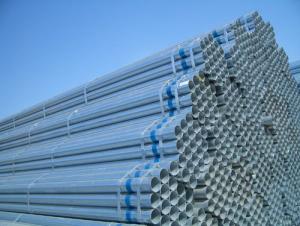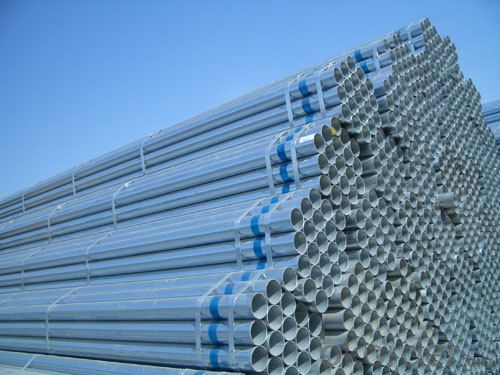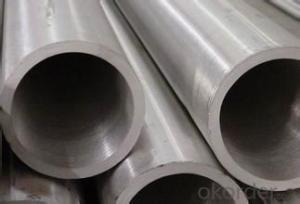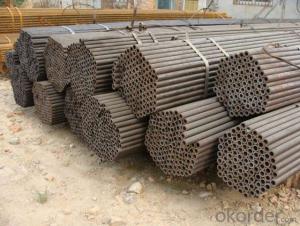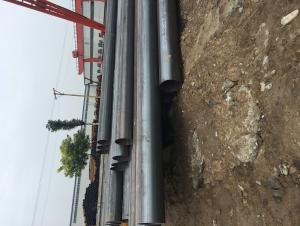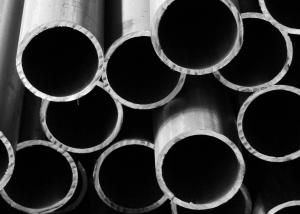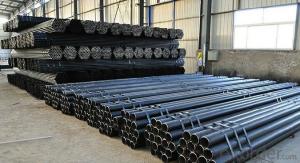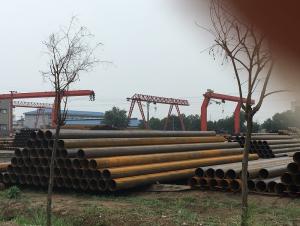Dual phase steel seamless pipe seamless steel pipe
- Loading Port:
- China Main Port
- Payment Terms:
- TT or LC
- Min Order Qty:
- 25 m.t.
- Supply Capability:
- 5500 m.t./month
OKorder Service Pledge
OKorder Financial Service
You Might Also Like
1、Structure of Welded Steel Pipe API SPEC 5CT:
Welded Steel Pipe is to be used for conveying gas, water, and petroleum foroil and natural gas industries. And used for structural steel pies purpose. As the manufacturing process does not include any welding, seamless pipes are perceived to be stronger and more reliable. Historically seamless pipe was regarded as withstanding pressure better than other types, and was often more easily available than welded pipe.
2、Main Features of Welded Steel Pipe API SPEC 5CT:
• High manufacturing accuracy
• High strength
• Small inertia resistance
• Strong heat dissipation ability
• Good visual effect
• Reasonable price
3、Welded Steel Pipe API SPEC 5CT: Specification:
Standard | GB, DIN, ASTM ASTM A106-2006, ASTM A53-2007 |
Grade | 10#-45#, 16Mn 10#, 20#, 45#, 16Mn |
Thickness | 8 - 33 mm |
Section Shape | Round |
Outer Diameter | 133 - 219 mm |
Place of Origin | Shandong, China (Mainland) |
Secondary Or Not | Non-secondary |
Application | Hydraulic Pipe |
Technique | Cold Drawn |
Certification | API |
Surface Treatment | factory state or painted black |
Special Pipe | API Pipe |
Alloy Or Not | Non-alloy |
Length | 5-12M |
Outer Diameter | 21.3-610mm |
Grade | 20#, 45#, Q345, API J55, API K55, API L80, API N80, API P110, A53B |
Standard | ASME, ASTM |
1) Material:20#(ASTM A 106/A53 GRB.API5LGRB,GB),45#,16Mn,10#.
2) Specification range:OD:21.3-610mm,WT:6-70mm,length:6-12m or according to the requirement of clients.
3) Excutive standards:GB,ASME API5L.ASTM A 106/A53,Despite of the above standards,we can also supply seamless steel pipe with standard of DIN,JIS,and so on,and also develop new products according to the requirements of our clients!
4) Surface:black lacquered,varnish coating or galvanized.
5) Ends:Beveled or square cut,plastic capped,painted.
6) Packing:bundles wrapped with strong steel strip,seaworthy packing.
4、Packaging & Delivery
Packaging Details: | seaworthy package,bundles wrapped with strong steel strip |
Delivery Detail: | 15-30days after received 30%TT |
5、FAQ of Welded Steel Pipe API SPEC 5CT:
①How is the quality of your products?
Our products are manufactured strictly according to national and internaional standard, and we take a test
on every pipe before delivered out. If you want see our quality certifications and all kinds of testing report, please just ask us for it.
Guaranteed: If products’ quality don’t accord to discription as we give or the promise before you place order, we promise 100% refund.
③Why should you chose us?
Chose happens because of quality, then price, We can give you both.Additionally, we can also offer professional products inquiry, products knowledge train(for agents), smooth goods delivery, exellent customer solution proposals.Our service formula: good quality+good price+good service=customer’s trust
SGS test is available, customer inspection before shipping is welcome, third party inspection is no problem.
6、 Welded Steel Pipe API SPEC 5CT: Images:
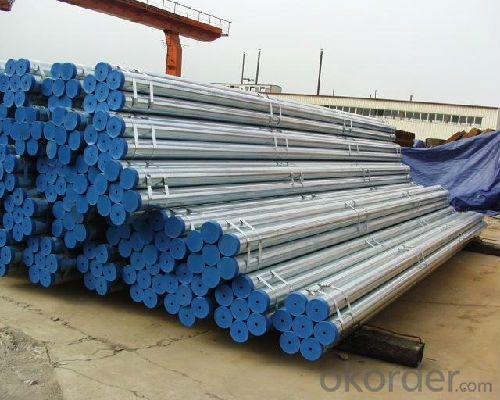
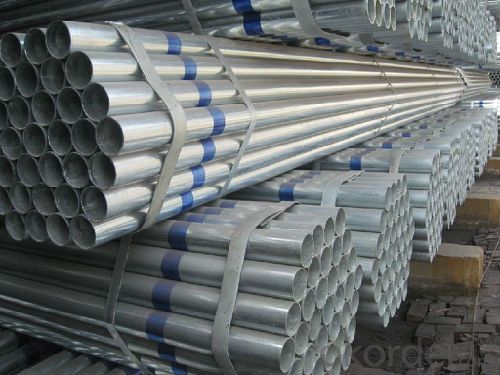
- Q: How are steel pipes used in water transportation?
- Steel pipes are commonly used in water transportation due to their durability and strength. They can be used for various purposes, such as carrying water from a source to a treatment plant, distributing water to different areas, and even for sewage systems. Steel pipes are highly resistant to corrosion and can withstand high pressure, making them ideal for long-distance water transportation.
- Q: Are steel pipes fire-resistant?
- Indeed, steel pipes possess fire-resistant qualities. Being a non-combustible substance, steel does not ignite or aid in the propagation of flames. Steel pipes exhibit elevated melting points and can endure extreme temperatures, rendering them exceptionally fire-resistant. Consequently, they find widespread utilization in critical areas necessitating fire safety measures, including fire sprinkler systems, fire hydrant systems, and fire-resistant architectural frameworks. Moreover, the fire resistance capabilities of steel pipes are reinforced by their renowned robustness and resilience.
- Q: Are steel pipes suitable for structural purposes?
- Yes, steel pipes are suitable for structural purposes. Steel pipes are known for their strength, durability, and versatility, making them an excellent choice for various structural applications. They can withstand heavy loads, provide excellent structural support, and are resistant to corrosion and extreme weather conditions. Steel pipes are commonly used in construction projects, bridges, buildings, and infrastructure systems such as water and gas pipelines. Additionally, steel pipes can be easily welded, bent, and cut to meet specific structural requirements, making them highly adaptable for different construction needs. Overall, steel pipes are widely recognized as a reliable and efficient choice for structural applications.
- Q: Can steel pipes be used for conveying natural gas?
- Certainly, natural gas can indeed be transported through steel pipes. In reality, steel pipes are frequently employed for this task owing to their robustness, long-lasting nature, and capacity to endure elevated pressures. Moreover, steel pipes exhibit exceptional resistance to corrosion, a vital feature when conveying natural gas containing impurities such as water and sulfur compounds. Furthermore, connecting various parts of the pipeline becomes effortless with steel pipes, thanks to their ease of welding. All in all, when it comes to conveying natural gas, steel pipes emerge as a trustworthy and secure option.
- Q: How do you protect steel pipes from rusting?
- To protect steel pipes from rusting, several methods can be employed. One common approach is to apply a protective coating to the pipes. This can be done by using paint or other types of protective coatings designed specifically for metal surfaces. The coating acts as a barrier between the steel and the elements, preventing moisture and oxygen from coming into contact with the metal and causing rust. Another method is to galvanize the steel pipes. Galvanizing involves coating the pipes with a layer of zinc, which creates a protective barrier that prevents rust from forming. This process is commonly used for outdoor applications or in environments where the pipes are exposed to moisture. Regular maintenance is also crucial in protecting steel pipes from rusting. This includes inspecting the pipes for any signs of corrosion or damage and promptly addressing any issues that are found. Additionally, keeping the pipes clean and dry can help prevent rust formation. In some cases, installing sacrificial anodes can provide additional protection against rust. Sacrificial anodes are made of a more reactive metal, such as zinc or magnesium, and are attached to the steel pipes. These anodes corrode instead of the steel, sacrificing themselves to protect the pipes from rust. Lastly, proper storage and handling of steel pipes is essential. This means storing them in a dry, well-ventilated area, away from moisture and humidity. It is also important to handle the pipes with care to avoid any scratches or damage to the protective coatings. By employing these methods and practices, steel pipes can be effectively protected from rusting, ensuring their longevity and durability.
- Q: What are the common defects found in steel pipes?
- Some common defects found in steel pipes include corrosion, cracks, pitting, scaling, and distortion.
- Q: Can steel pipes be used for transporting gases and liquids?
- Yes, steel pipes can be used for transporting gases and liquids. Steel pipes are commonly used for this purpose due to their durability, strength, corrosion resistance, and ability to withstand high pressures. Additionally, steel pipes are versatile and can be customized to meet specific requirements for different types of gases and liquids.
- Q: Are steel pipes suitable for use in acidic environments?
- Yes, steel pipes are generally suitable for use in acidic environments. However, the specific grade of steel and the concentration of the acid should be considered to ensure proper corrosion resistance. Coating or lining the pipes with materials such as epoxy or rubber can also enhance their resistance to acidic conditions.
- Q: What's the difference between a rectangular tube and a rectangular steel tube?
- Rectangular tube is a kind of hollow long strip steel, also known as flat tube, flat square tube or square flat tube (Gu Mingsiyi). A large amount of pipe used to transport fluids, such as petroleum,Natural gas, water, gas, steam, etc., in addition to bending and torsional strength of the same weight is lighter, so it is also widely used in the manufacture of machinery parts and engineering structures. It is also used to produce all kinds of conventional weapons, guns, shells and so on.
- Q: What is the impact resistance of steel pipes?
- Steel pipes have a high level of impact resistance thanks to the natural properties of steel. Steel, known for its strength and durability, can endure substantial external forces and impacts without deforming or breaking. The impact resistance of steel pipes is further improved by their construction and design. Various manufacturing techniques, such as seamless or welded construction, are used to create steel pipes, ensuring uniformity and strength throughout the structure. This construction process eliminates weak points or seams that could compromise the pipe's impact resistance. Additionally, steel pipes can be customized to meet specific impact resistance requirements based on their intended use. Different grades and types of steel can be utilized to achieve varying levels of impact resistance, allowing for customization to suit different industries and environments. The excellent impact resistance of steel pipes is particularly advantageous in industries such as construction, oil and gas, and transportation. These industries subject pipes to heavy loads, pressure, and potential impacts. Steel pipes can withstand these harsh conditions, making them a dependable choice for a wide range of applications. To summarize, steel pipes have outstanding impact resistance due to the inherent strength and durability of steel, as well as the construction techniques employed during manufacturing. Steel pipes can withstand significant external forces and impacts, making them a reliable and sturdy option for various industries and applications.
Send your message to us
Dual phase steel seamless pipe seamless steel pipe
- Loading Port:
- China Main Port
- Payment Terms:
- TT or LC
- Min Order Qty:
- 25 m.t.
- Supply Capability:
- 5500 m.t./month
OKorder Service Pledge
OKorder Financial Service
Similar products
Hot products
Hot Searches
Related keywords
